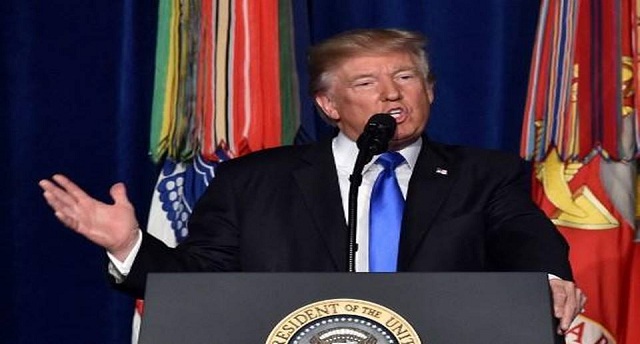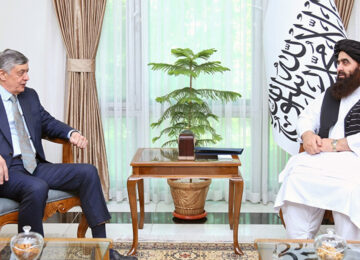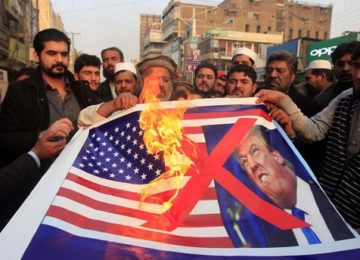Many predictions regarding Donald Trump, before his election, as a dangerous choice for the presidential chair have now become a reality. Trump, who is considered by some as a populist President, diverges conspicuously from the core values of American presidential legacy. Since the 2016 presidential elections, the US, under Trump, has maneuvered its role in the international arena in a way that has unsettled many states, including its long term allies.
There is a spate of post-Trump US global engagements that has distorted international economic and political equilibrium, which was considered nascent. Earlier this year, the US withdrawal from the Iran Nuclear deal raised many eyebrows as the Obama, Trump’s predecessor, administration had committed to the deal. Iran Nuclear deal, also known as the Joint Comprehensive Plan of Action (JCPOA) was a long term convention regarding its Nuclear program with P5+1 group of World powers – the US, UK, France, Russia, China and Germany. The idea behind the deal was Iran’s stringent commitment towards nuclear non-proliferation. The Trump administration cannot bear any finger pointed towards its fraternal entity- Israel, so it responds aggressively. Washington demands Iran to halt its long range missile production, stop the fissile material production and allow thorough inspection of its nuclear facilities. The US Secretary of State, Mike Pompeo, laid out 12 far reaching demands for any new nuclear deal with Iran. Being pragmatic, these strict demands are basically intended to neutralize Iran’s persuasive role in the Levant region.
Despite Iran’s denouncements, the US has maintained that trade ties with Tehran must be terminated or else deviating countries, with business interests in the US, would have to face the secondary sanctions. Adding insult to the injury, Iranian Rial plummeted by 40 percent, distorting the economic state of the country and engorging the debt. Most of the countries announced to discontinue oil imports from Iran after November. Despite European Union’s criticism on Trumps decision to withdraw from the JCPOA, the US has asked Saudi Arabia to expand oil production due to the share cut from Iranian oil.
On another front, in April this year, a full-fledged trade war initiated between the US and China, and that again because of Trump’s brash rhetoric. The new tariff policy of the Trump administration led to the imposition of 25 percent tariff on $50 billion worth of Chinese goods, prominently steel and aluminium, and warned to escalate the targeted goods up to $500 billion. The idea behind the imposition was Trump’s accusation of China stealing the US industry’s intellectual rights. As a retaliation policy, Beijing also imposed similar tariffs on equal amount of US products including pork, beans and electronic cars. This imposition of $50 billion tariff could be deciphered as a modern deterrence policy tool, as the dimensions of vexed confrontations are shifting from conventional armament approaches to economic destabilizing, especially in case when your adversary is as mighty as you are.
But if this trade war intensifies to $500 billion, then it would lead to a global predicament. The US farmers are already facing the ramifications of Trumps penchant for executing venal trade policies. Moreover many of the US companies would be affected, who have outsourced industrial production to China. Even though the two giants have carried out this irrational trade policy to protect their own respective industries, there is a spate of consequential effects expected to impinge on global market. Prominently, crude oil price is plunging. High tariff on Chinese goods means less of Chinese goods imported to US. As a result, the Chinese industry would slow down- effectively demanding lower levels of inputs and ultimately hurting employment numbers. A similar scenario would occur for the US. According to Oxford Economics- an economic consultancy, this trade war will impede 0.1 to 0.2 percent of each country’s growth rate. Bank of England estimates full blown trade war would end up hitting global GDP by 2.5 percent over the course of three years. Trump is not only opting for agitated trade policy against China, but also levied large tariffs on Canadian, European and Mexican steel and aluminium. Moreover Pakistan is considered to be least affected by the current trade conflicts due to its low share in the world trade, given that the situation does not change any further. Pertinent to mention here is India- the biggest buyer of US almonds and its strategic political ally – that did not receive exemption from US tariffs. As a reaction, Delhi imposed tariffs of $240 million on US goods.
Talking of Pak-US ties, the US has always designated Pakistan as a key player to achieve regional peace in the South Asia, especially in Afghanistan. A stark contrast has remained between USA’s words and actions when it comes to Pakistan. Pakistan is the most affected state in the US war on terror. The presence of US soldiers in Iraq and Afghanistan has not only escalated security issues in Pakistan but also indirectly bogged down its economy. Pakistan has thus fought a ‘thankless’ war for which it never gets due credit. The Trump administration has been continuously putting pressure on Pakistan to ‘do more’, threatening the country’s name be placed on FATF (Financial Action Task Force) black list – allegedly designating the state responsible for terror financing.
Moreover the US has recently closed down various military training programs for Pakistani military officials. The effective suspension of Pakistan from US government International Military Training Program (IMTP) will close off places that had been set aside for 66 Pakistani officials. This punitive measure of suspending a coveted military training program in the backdrop of spate of new US South Asia policy towards Pakistan could have detrimental effects. USA’s heavy handed approach would only exacerbate the relations between the two nations. As Pakistan’s foreign strategic ties and amicable dimensions are inclining towards China, USA could even get itself deprived of its legitimate demands. Even if the US somehow decides to backtrack on its Pakistan policy, Islamabad would not favour it as it has recently signed a military training contract with Russia. Security ties between Islamabad and Moscow are embarking a new healthy trajectory over the past few years.
Trump has also locked horns with Turkey and its president Erdogan. The US has imposed sanctions on a couple of Turkey’s ministers along with doubling the tariff on Turkish steel and aluminium. Since these aggressive measures, Turkey has serious economic problems. Its currency, Lira, is constantly depreciating against the US Dollar. Erdogan also retaliated by imposing tariffs of about $540 million on US goods including cars, alcohol, tobacco cigarettes and electronic goods. To bolster the currency depreciation, Erdogan has carried out a non-conventional monetary policy response by lowering the country’s interest rate. Even though many have remained sceptical about Erdogan’s low-interest policy, they still hope the President will succeed in pulling the country out of adversity.
Since Donald Trump assumed power, things have gone from bad to worse in the global political arena. The US has not only lost the global respect it once enjoyed as a mediator, but has also started acting as a rogue imperial power. Boasting the largest economy in the world, Trump has to realise that the new world order require states and nations to work together as a network, rather than functioning in isolation. If Trump persists with his current path of confrontation, it will only lead to erosion of USA’s global influence and respect.
*The author Muhammad Abdullah is a graduate from School of Economics, Quaid-i-Azam University (QAU), Islamabad. He also holds an M.Phil in Economics from Pakistan Institute of Development Economics (PIDE), Islamabad. Currently, he works at Pakistan Bureau of Statistics.
© Center for Research and Security Studies (CRSS) and Afghan Studies Center (ASC), Islamabad.








